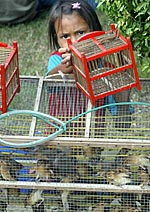




LONDON—Thai health authorities have confirmed the death of a 14-year-old girl from avian influenza, just a day after the European Union declared a health alert after two Asian eagles on a flight from Bangkok were found to be infected by the virus.
The girl died Oct. 19 in the northern Thai province of Sukhothai and confirmed as having been infected with the deadly H5N1 influenza virus strain by the country’s health ministry Oct. 25.
Her death brings the number of human fatalities in Southeast Asia this year to 32.
The European Commission issued a warning statement to airline passengers after two eagles carried last week to Belgium by a Thai man were found to be infected with avian flu.
“Passengers who traveled on Oct. 17/18 from Bangkok to Vienna with EVA AIRWAYS number BR0061 and passengers who traveled on Oct. 18 from Vienna to Brussels with AUSTRIAN AIRLINES number OS351 are advised to see their doctor if they have any flu-type symptoms,” the EC statement said.
“Although the risk of transmission from the animals to humans is limited, it cannot be excluded since the birds traveled in the passenger cabin in hand luggage,” the EC statement said.
The unidentified Thai man was stopped by customs officers at Brussels airport when the eagles were discovered in his bags last week, alive and wrapped up in plastic tubing. The man was released before the infections became apparent.
Meanwhile, China’s health authorities have set up a team of influenza experts for the prevention and treatment of all forms of the virus as the flu season begins, official media reported.
According to China's Xinhua news agency, the experts will serve for terms of three years, will provide technical guidance and training to local health agencies on the monitoring of flu epidemics and offer on-the-spot assistance.
Bird flu has ravaged poultry farms in 16 Chinese provinces, autonomous regions and municipalities as well as several other countries in Asia. While human infections of H5N1 have been reported in Vietnam and Thailand, China hasn’t admitted to any human cases of the disease.
But Chinese experts have pointed to several instances of avian flu in pigs. Once influenza mutates and infects pigs, it is far closer to a form that can infect humans. Many influenza strains are born where poultry, pigs, and people live in close contact.
Chinese officials claim that no human infections have been found so far, but they had also previously claimed that no pig infections had been found.
Chinese public health procedures have come under intense scrutiny and suspicion since an official attempt to cover up the extent of the SARS epidemic of 2003 was exposed by a military doctor in Beijing.
World Health Organization (WHO) officials have repeatedly warned that a global flu pandemic is likely, especially as avian flu was also recently found in tigers in Thailand.
Larger mammals are regarded as potential “mixing-vessels” that enable the bird-based virus to mutate to a form that can infect humans.
The deadly H5N1 strain of bird flu appeared throughout Asia early this year, ravaging poultry farms and sparking a region-wide health scare. Authorities in Asia culled tens of millions of birds in an attempt to thwart the spread of the disease, but it resurfaced in July.